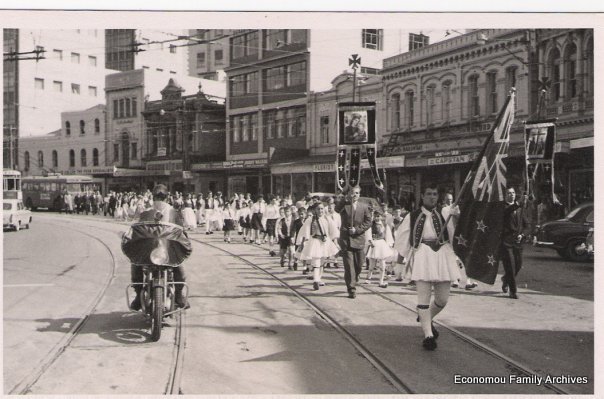"Claiming Macedonia" : The Struggle for the Heritage, Territory and Name of the Historic Hellenic Land,
1862-2004.
By : George C. Papavizas
Published by: McFarland & Company, Inc.,
Publishers Jefferson, North Carolina, and London
When I was thirteen years old I asked my grandfather Constantine why he had joined the Greek andartes (freedom fighters) in 1904 and fought for four years in Macedonia against the armed Slavic bands (komitadjides, committee men) of the clandestine Bulgarian Komitet "Internal Macedonian Revolutionary Organization" (IMRO, Vatreshna Makedonska Revolutionna Organizadja). Still under the Ottomans in the early 1900s, western Macedonia and Krimini, the small village with its four hundred Greek-speaking inhabitants where I was born, were in the forefront of the so-called Macedonian Struggle (Makedonikos Agonas that lasted four years. Looking at me straight in the eyes for a long time in silence, twirling his long moustache, his sixty-year-old weather-beaten face furrowed in deep pain because of the distortion of historical facts on Macedonia emanating from the Slavic north, he said softly with tears in his eyes:
"To make certain that after the Turks, our Macedonia remains Hellenic and my children and grandchildren enjoy freedom as Hellinomakedones" (Greek Macedonians).
Always with a permanent genteel expression evincing compassion and understanding, Kotas, as he was known among his friends and relatives, was a man of genuine affability and modest demeanor, underlined by a powerful mix of genuine Hellenic Macedonian values and an unusually strong commitment to family and the Greek Orthodox Church. Representing an exclusive group of brave men with a tenacious belief in Macedonian Hellenism, Kotas, my hero grandfather, had no bigotry, hate, or chauvinism in his heart. What, then, motivated the prudent and peaceful man to become a guerrilla fighter for Macedonian Hellenism when even the official Greek government kept a cautious and ambivalent approach to the Macedonian problem and a safe distance from the Macedonian Struggle in the early years? Only an intense, innate passion for Macedonian Hellenism's fate and a distaste for history's distortion could incite him to leave his family for four years for the undeclared vicious guerrilla fight against the Turks and Bulgarians. He died of pneumonia at sixty, leaving behind an deep feeling of patriotism for all and an indelible, life-long Hellenic Macedonian legacy that has had a major impact on me, his first grandson.
Sixty years later I was at my son's house for Thanksgiving dinner. Before I sat down, my eight-year-old grandson, Aidan, ran to me and brandished the Scholastic Atlas of the World, published by Miles Kelly Publishing Ltd. in Great Bardfield, Essex. He proudly demonstrated his geography skills by naming several countries around the world without reading the names, leaving his best for the end, the map of Greece. He looked at it for a few seconds, placed his finger on the word "Macedonia," looked at me with his intelligent blue eyes, and said:
"Here, Papou [Grandfather]; I know where Macedonia is, where you were born."
Suddenly, he looked at me again and said, disappointed,
"But - you told me you were born in Macedonia, Greece." ....
To read more from George Papavizas' introduction and find out more about the very valuable background to this book, Click Here
To buy the book from Amazon, Click Here




this is definitely a 'must read' for all of us
ReplyDelete